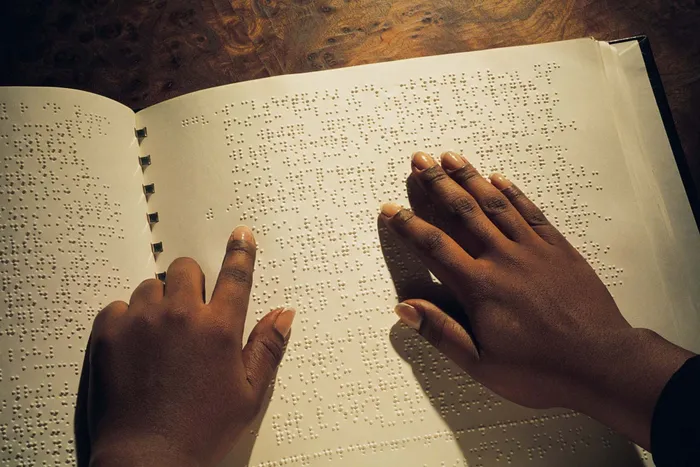Landmark Concourt victory for the blind

The Constitutional Court has ruled for the creation of accessible format copies like braille of copyrighted works without needing permission from the copyright holder.
Image: File
IN A landmark victory for the blind, the Constitutional Court has ruled for the creation of accessible format copies like braille of copyrighted works without needing permission from the copyright holder, specifically for the benefit of persons with disabilities.
“This will allow blind people to have better access to published work so that it can improve our education and access to reading and material and thereby improve our participation in the economy and the country. For the last 20 years we’ve been trying to advocate for the exceptions in legislation,” said BlindSA CEO, Jace Nair.
The case centred on the President not signing the Copyright Amendment Bill (CAB) by September 2024, which caused the suspension of certain invalid sections of the Copyright Act to expire, creating a gap in the law.
Blind SA, represented by Section27, had challenged certain provisions of the Copyright Act that criminalised anyone who converted reading materials into accessible formats, like braille or large print, without the consent of the copyright holder.
The legislative process relating to the amendment of the Act began in 2015, when Parliament published the CAB. The Bill introduced clause 19D, which aimed to create exceptions for people with visual and print disabilities to access copyrighted works.
The CAB was passed and sent to the President for his assent on 28 March 2019. On 16 June 2020, the President referred the CAB back to Parliament for reconsideration, as he had reservations about the constitutionality of some of the draft provisions in its initial version.
Due to the delays in finalising the CAB, Blind SA launched an application in the high court in Gauteng in 2021, for a declaration of invalidity of sections 6 and 7 read with section 23 of the Act. The court found in their favour and declared the impugned sections inconsistent with the Constitution and invalid.
In 2022, the Constitutional Court confirmed the declaration of constitutional invalidity of the impugned provisions. At the time, the court held that these provisions were inconsistent with the constitutional rights of people with disabilities and held that requiring the permission of the copyright owners to create accessible formats amounted to a discriminatory barrier that unfairly prevented people with visual and print disabilities from accessing copyrighted materials.
In terms of relief, the court suspended its declaration of invalidity and ordered Parliament to fix the Copyright Act within 24 months.
The court also crafted its own interim exception to copyright for persons who are blind or visually impaired, “section 13A”, which was read into the Copyright Act over this period while waiting for Parliament to effect the changes.
Even after Parliament made the necessary amendments through the CAB, and included an exception to copyright that would not only benefit persons who are blind or visually impaired, but all persons with disabilities, the president did not sign it into law by the deadline last year. The invalidity of the legislation then took effect, and persons whose rights were protected by the interim remedy could no longer benefit from it.
Blind SA then again approached the apex with an urgent application for direct access and sought an order resuscitating the section 13A reading-in remedy or a section similar that would grant interim protection.
The Concourt on Wednesday found that the failure to enact the CAB within 24 months did in fact create a legal gap, and reverted to the position before this court’s original order.
Justice Nonkosi Mhlantla ruled: “The lapsing of section 13A has created an immediate rights vacuum affecting the constitutional rights of visually and print-impaired persons, therefore, it is imperative that these rights are protected. Clause 19D provides a more comprehensive framework aligned with both constitutional imperatives and international obligations, particularly the Marrakesh VIP Treaty. Where section 13A provided restricted relief focused solely on visual or print disabilities, clause 19D establishes a comprehensive scheme aligned with contemporary disability rights jurisprudence.
"The reading-in would be temporary in nature, serving as an interim bridge ensuring that the CAB’s stated objectives persist despite procedural delays, and will remain until the formal legislative process is finalised," said the court.
"Pending the coming into force of legislation remedying the constitutional defects in the Copyright Act 98 of 1978 as identified by this Court’s judgment and order of 21 September 2022, the Copyright Act 98 of 1978 shall be deemed to include a section 19D reading as follows: 'Section 19D. (1) An authorised entity, or any person as may be prescribed and who serves persons with disabilities may, without the authorisation of the copyright owner, make an accessible format copy for the benefit of a person with a disability, supply that accessible format copy to a person with a disability by any means, including by non-commercial lending or by digital communication by wire or wireless means, and undertake any intermediate steps to achieve these objectives, if... conditions are met',” ruled Justice Mhlantla.
The presidency did not respond to a request for comment by deadline.
Cape Times